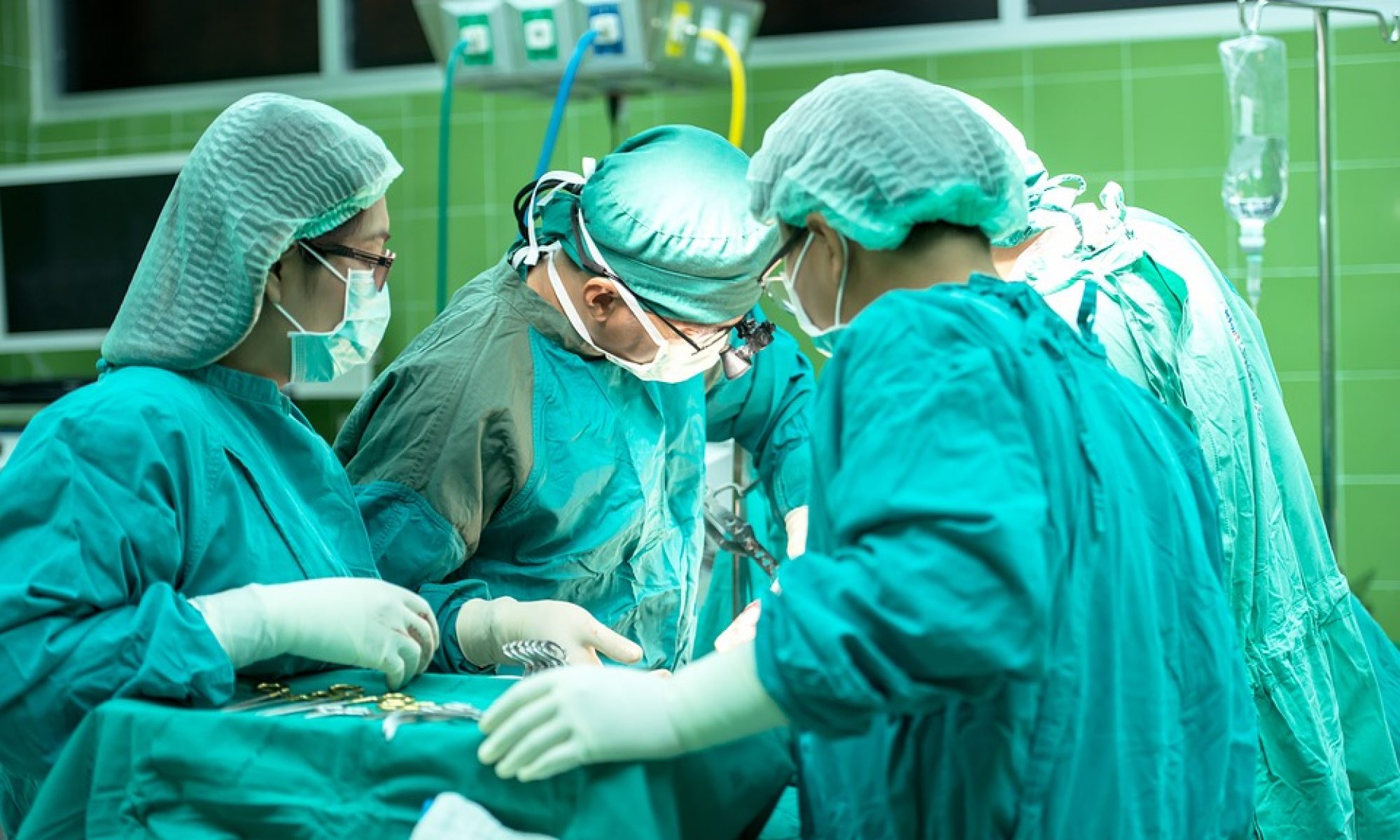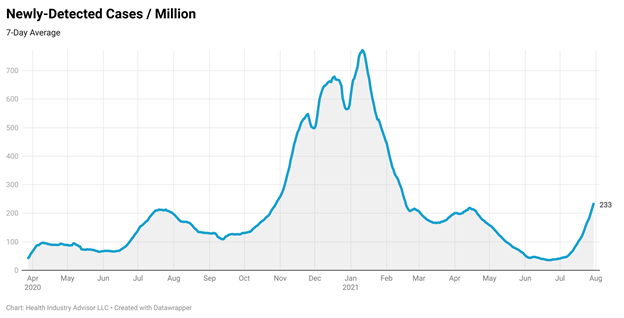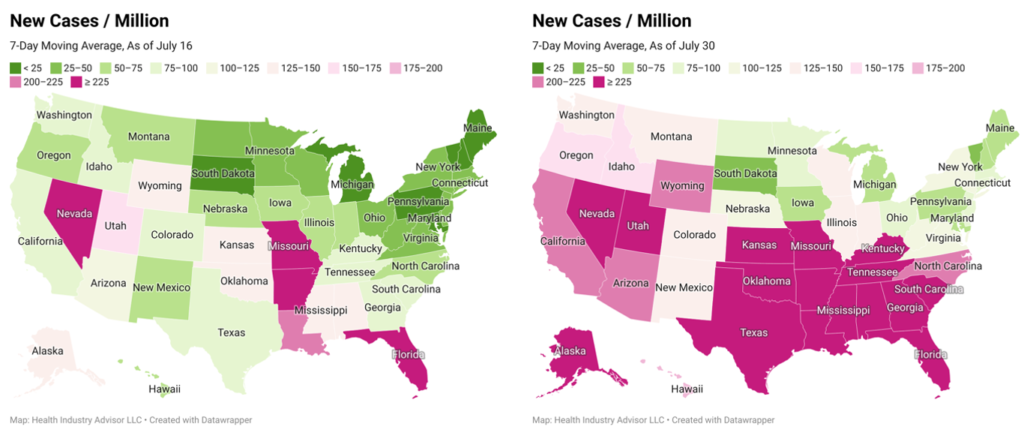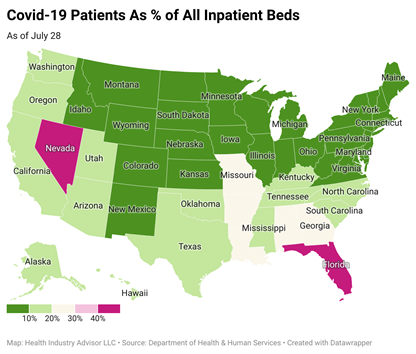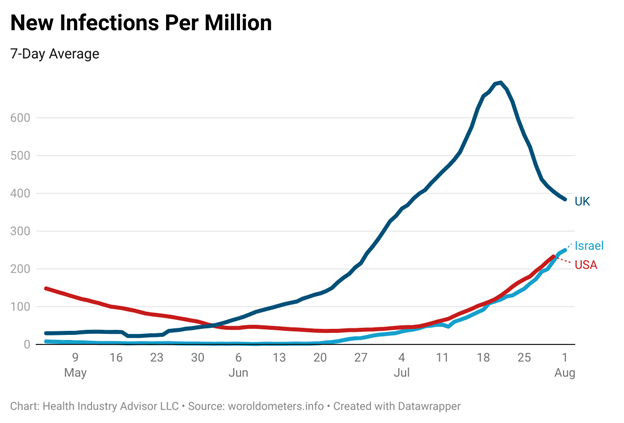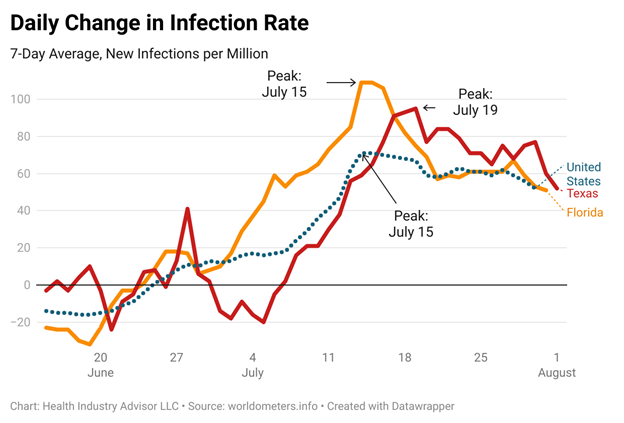Kelly Gooch and Hannah Mitchell – Updated Friday, July 30th, 2021 Becker’s Hospital Review
The number of hospitals and health systems requiring COVID-19 vaccination for employees is growing.
Here are the healthcare organizations that have announced mandates:
Editor’s Note: This webpage was updated July 30 and will continue to be updated. The list is in chronological order based on when the mandate was announced or reported on.
Arkansas Heart Hospital in Little Rock said July 30 its directors, executives, managers, advanced practice nurses, physicians and physician assistants will be required to be fully vaccinated for COVID-19 by Sept. 30. On Aug. 1, new employees will be required to receive their first dose within 30 days of employment.
Phoenix Children’s is mandating vaccines for all staff, effective Oct. 1. The hospital told Becker’s July 30 that most of its staff is already fully vaccinated, but it will support the remaining employees as they work toward getting inoculated.
Texas Health Resources in Arlington said July 30 that it will require vaccination as a condition of employment. Employees will need to have received either both shots of the Pfizer or Moderna vaccine or one Johnson and Johnson shot, effective Sept. 10. The policy also applies to physicians and advanced practice providers on the medical staffs, students, vendors and contractors.
The policy is a crucial step to fighting the surging delta variant and will protect both patients and caregivers. Similar to the flu vaccine, being fully vaccinated against COVID-19 will be a condition of employment for all Texas Health employees. To be considered fully vaccinated, either both shots of the Pfizer or Moderna vaccine or the single Johnson and Johnson must be administered. The policy goes into effect on Sept. 10.
Conway (Ark.) Regional Health System said July 29 that it will require new hires and leaders, including executive leadership, directors and managers, to get vaccinated. The requirement is effective Aug. 8. Leaders receiving two vaccine doses will be required to receive the second dose by the end of August, the health system said. New hires receiving two vaccine doses will be required to get the second dose within 30 days of employment.
Millinocket (Maine) Regional Hospital will require employees to receive the Pfizer or Moderna shots when they receive final FDA approval, the Press Herald reported July 29. Staff will be able to request exemptions.
Methodist Health System in Dallas said July 29 that it will require its workforce to be vaccinated by Oct. 1. The health system said once it achieves its workforce vaccination goal, full-time employees will receive a $500 bonus, and part-time employees will receive $250.
Self Regional Healthcare in Greenwood, S.C., is requiring team members to get vaccinated, Fox Carolina reported July 29. The organization said it aims to have unvaccinated employees inoculated by Sept. 30, according to the report.
ChristianaCare said July 29 that it will require employees, medical-dental staff, residents, students, contracted employees, temporary labor, volunteers and vendors to be vaccinated. Caregivers at the Newark, Del.-based health system must receive their first vaccine dose of a two-dose vaccine or their single Johnson & Johnson shot by Sept. 21.
Children’s Hospital of Philadelphia will require workforce members at any location to get inoculated, the hospital said July 29. A deadline has not been announced.
Mary Washington Healthcare in Fredericksburg, Va., will require its workforce to get vaccinated by Oct. 31, the health system said July 29. The requirement will apply to employees, medical staff and volunteers.
UCHealth, an Aurora, Colo.-based health system with 26,000 employees, said July 28 that it will require employees, providers, volunteers and partners to be vaccinated by Oct. 1. UCHealth’s employees may receive the vaccine of their choice or obtain an exemption for medical or religious reasons. Those who obtain an exemption must wear a mask at all times in UCHealth facilities and be tested weekly, the health system said.
Pullman (Wash.) Regional Hospital will require employees to be fully vaccinated or complete the exemption process, by Oct. 27, the hospital said July 28. Employees can request a medical exemption, religious belief exemption or personal belief exemption. The personal belief exemption will expire on June 1, 2022, or within two months of full FDA approval of a vaccine.
Baylor Scott & White Health, a 52-hospital health system based in Dallas, is requiring employees, providers, volunteers, vendors, students and contract staff to receive both doses of the Moderna or Pfizer COVID-19 vaccine, or the single-dose Johnson & Johnson shot, unless granted an exemption, the health system said in a statement shared with Becker’s July 28. The deadline for the requirement is Oct. 1.
Spectrum Health in Grand Rapids, Mich., said July 28 that it will require the COVID-19 vaccine for team members, medical staff, students, volunteers and contractors. The 14-hospital health system plans to require vaccination within eight weeks of the FDA approving the first vaccine, or sooner depending on pandemic circumstances. Spectrum will consider exemptions.
Ascension, a 149-hospital health system based in St. Louis, will require COVID-19 vaccination for its 160,000 employees. Ascension’s requirement will apply to workers who provide direct patient care, as well as those who work in health system sites of care or remotely, the health system said July 27. This includes workers employed by subsidiaries and partners; physicians and advanced practice providers (employed and independent); and volunteers and vendors entering health system locations. Ascension said employees have until Nov. 12 to complete the vaccine series and meet the vaccination requirement.
Care New England is moving forward with mandatory vaccination for all staff, the Providence, R.I.-based health system said July 27. Vaccination has been required for students, volunteers and new hires since July 1, and the next step is to require managers to begin the vaccination series before Labor Day, said Care New England.
Baystate Health said July 26 that employed team members, including those working remotely, clinical staff, contractors, volunteers, students, and those conducting business within the Springfield, Mass.-based health system, will be required to be fully vaccinated by Oct. 1. Employees will be able to request an exemption for religious or medical reasons, and pregnant employees may request a deferral.
Truman Medical Centers/University Health in Kansas City, Mo., said July 26 that vaccination will be a requirement for staff members, according to KMBC. The deadline to be vaccinated is Sept. 20.
Mayo Clinic in Rochester, Minn., said all health system staff must be fully vaccinated by Sept. 17. Those who do not meet the deadline will be able to keep their jobs. However, they will be required to complete a formal refusal process, which includes watching education modules, wearing face masks and maintaining social distancing while on campus.
The Department of Veterans Affairs is mandating COVID-19 vaccinations for 115,000 of its front-line healthcare workers, the first federal agency to do so. Starting July 28, those workers have eight weeks to get fully vaccinated or face penalties, including possible removal.
Rush University Medical Center in Chicago is requiring its workers, contractors and volunteers to get the shot. They must be fully vaccinated by Oct. 1.
HonorHealth in Scottsdale, Ariz., said July 23 that it will require vaccination as a condition of employment. Employees must submit proof of vaccination by Nov. 1.
Sanford Health in Sioux Falls, S.D., said July 22 that all employees across its 46 hospitals and hundreds of other medical facilities will be required to be vaccinated by Nov. 1. More than 90 percent of clinicians and 70 percent of nurses are already vaccinated, the health system said. Those who do not get vaccinated will not be working, but a final decision on a furlough has not been decided.
Duke University Health System, a three-hospital health system based in Durham, N.C., is requiring vaccination for employees. The deadline for employees is Sept. 21, news station ABC11 reported July 22.
Cone Health in Greensboro, N.C., said July 22 that it will require vaccination for workers, effective July 30. The mandate will apply to employees, medical and dental staff, professional students and volunteers. The deadline for compliance is Oct. 1.
UNC Health said July 22 that it will require teammates at UNC Medical Center, UNC Rex Healthcare, Chatham Hospital, Johnston Health, UNC Health Southeastern, UNC Rockingham Health Care, UNC Physicians Network Practices and UNC Health Shared Services locations to get vaccinated. The deadline for employees at the Chapel Hill, N.C.-based health system is Sept. 21.
Wake Forest Baptist Health said July 22 that the Winston-Salem, N.C.-based organization is requiring teammates to be fully vaccinated or obtain an approved medical or religious exemption. The mandate applies to remote workers, physicians, medical residents, faculty, fellows, trainees, contractors, students/visiting students, members of the medical staff, temporary workers and volunteer staff.
Novant Health is requiring team members to be fully vaccinated, the Winston-Salem, N.C.-based health system said July 22. Workers must be vaccinated by Sept. 15.
Atrium Health is making vaccination mandatory for all teammates, the Charlotte, N.C.-based health system said July 22. Teammates, including remote workers, physicians, medical residents, faculty, fellows, trainees, contractors, students/visiting students, members of the medical staff, temporary workers and volunteer staff, must be fully vaccinated or obtain an approved medical or religious exemption by Oct. 31.
Arkansas Children’s in Little Rock is requiring that its leaders (managers, directors, vice presidents, senior vice presidents and executive vice presidents) receive a first vaccine dose as a condition of employment, according to a message sent July 22 from Marcy Doderer, president and CEO. Leaders must receive their first dose by Aug. 20 and be fully vaccinated by Sept. 30. Beginning Aug. 16, all new Arkansas Children’s new hires will also be required to receive a first shot by their start date and a second one within 30 days of employment, said Ms. Doderer.
OSF HealthCare, a multistate health system based in Peoria, Ill., said July 21 that it will require all employees to be vaccinated against COVID-19 by the end of September. The requirement does not apply to Michigan Nursing Association bargaining unit members. OSF HealthCare has 150 locations in Michigan and Illinois.
Banner Health will require COVID-19 vaccination as a condition of employment for its roughly 52,000 team members, the Phoenix-based health system said July 20. The deadline for employees to be fully vaccinated is Nov. 1, with limited exceptions.
Southcoast Health, a three-hospital health system offering services in southeastern Massachusetts and Rhode Island, said vaccines will be mandated for all employees, staff and providers once at least one of the vaccines receives full FDA approval, The Standard-Times reported July 20. Employees will be able to request exemptions if they have documented medical and religious reasons, or if they are pregnant or intend to become pregnant.
Valley Health, a Winchester, Va.-based health system with 6,300 employees and affiliated physicians, said July 19 that it will add COVID-19 vaccination to its list of required vaccinations for all employees, medical staff members and contractors. Health system officials said the standard is effective immediately for new employees, who must provide evidence of vaccination or complete the vaccination series two weeks before beginning work. Employees who are managers or above and medical staff members must provide evidence of prior completion of the vaccination series or receive their first dose by Aug. 16. Remaining staff have until Nov. 1 to either obtain an exemption or be fully vaccinated.
Tidelands Health in Georgetown, S.C., said July 16 that it will mandate vaccination for employees, employed providers, volunteers, learners and contractors. Employees have until Sept. 7 to comply, and the health system is providing an attestation and declination process for those who cannot get vaccinated for medical or religious reasons. Tidelands Health said employees who have previously tested positive for COVID-19 may also choose to decline the shot.
Hackensack Meridian Health, a 17-hospital system based in Edison, N.J., will require its staff to be fully vaccinated against COVID-19, NorthJersey.com reported July 15. A memo to employees cited by NorthJersey.com gave Nov. 15 as the deadline for the mandate. Workers, including physicians and nurses, must receive at least one dose of the Pfizer, Moderna or Johnson & Johnson shots by Oct. 1 and a second dose of Pfizer or Moderna by Nov. 15. The deadline to request an exemption is Aug. 16.
Beacon Health System in South Bend, Ind., said July 15 that it will require employees and others who work regularly at a Beacon facility to be fully vaccinated by Oct. 1. Employees may request an exemption.
Vanderbilt University Medical Center in Nashville, Tenn., will require its entire staff to get the vaccine, according to an employee newsletter distributed July 15. All hospital leaders must get the first dose or achieve a medical exemption by Aug. 15 They must fully be vaccinated by Sept. 15. The deadline for all employees is under consideration.
The University of Mississippi Medical Center in Jackson said July 15 that it will implement a new vaccination policy requiring those who work or learn in a medical center-controlled space to be fully vaccinated against COVID-19, with limited exceptions, or wear an N95 mask while at any medical center facility. Medical center officials said those who are fully vaccinated will only be required to wear a mask of their choosing or as determined according to the clinical situation in patient care areas. The policy will be phased in over three months, with all who work in a medical center-controlled space required to be fully vaccinated or wearing an N95 mask at all times on or by Nov. 1.
Hartford (Conn.) HealthCare said July 14 that it will require COVID-19 vaccination for its employees. Health system officials said employees may apply for an exemption, but those without an approved exemption must show proof of vaccination by the end of September.
St. Jude Children’s Research Hospital said July 14 that the Memphis, Tenn.-based hospital and its foundation partner, ALSAC, are requiring that St. Jude and Memphis-area ALSAC employees be vaccinated against COVID-19 by Sept. 9. In a memo, St. Jude President and CEO James Downing, MD, told employees they must have their final dose scheduled and administered by the deadline, or, if vaccinated outside of St. Jude, have the documentation to the hospital by the deadline date.
University of Chicago Medicine will require its workers to be vaccinated against COVID-19, according to a July 13 memo to students, faculty and staff. The mandate will apply to employees of University of Chicago Medical Center and to medical center volunteers and contractors at both the Hyde Park campus and other medical center sites, health system leaders wrote. They added that the mandate may be subject to discussion with unions representing workers.
Piedmont Healthcare in Atlanta said June 12 it is requiring leaders, physicians, providers and new employees to be fully vaccinated against COVID-19, with plans to eventually extend the mandate to all its more than 23,000 workers. As of Sept. 1, the mandate will apply to that initial group and to the rest of Piedmont’s employees in “the near future,” following Sept. 1.
Virtua Health in Marlton, N.J., will require its more than 14,000 workforce members to be fully vaccinated against COVID-19. Virtua employees must be fully vaccinated by Sept. 15. Virtua said July 12 that all employees, regardless of vaccination status, will continue to maintain COVID-19 safety protocols per CDC guidelines, and it will consider employee requests for exemptions based on religious beliefs or disability/medical condition.
Uvalde (Texas) Memorial Hospital is requiring its 493 employees to be fully vaccinated against COVID-19. Employees were notified of the mandate July 7 and have until Aug. 6 to obtain an initial or final dose of the shot of their choice. Uvalde Memorial said July 12 that staff may apply for medical exemptions or religious objections.
Inova Health System in Falls Church, Va. informed its 18,000 employees that they will have to be vaccinated by Sept. 1.
Trinity Health in Livonia, Mich., will require its 117,000 employees across 22 states to get the COVID-19 vaccine after the number of employees who received at least one shot stagnated at 75 percent.
St. Luke’s Health System in Boise, Idaho, will require its employees to be vaccinated against COVID-19, according to a memo sent to employees July 8 from Chris Roth, president and CEO of the health system. St. Luke’s will require all employees, providers, volunteers and contractors to receive their first vaccine dose by Sept. 1.
Mercy in St. Louis will require its 40,000 employees across 44 hospitals and healthcare facilities to receive the COVID-19 vaccine, health system officials said on July 7. All employees will be required to be vaccinated by Sept. 30.
University Hospital in Newark, N.J. will require all of its employees to be vaccinated, according to a June 30 report.
Yale New Haven (Conn.) Health officials said in a June 30 press conference that all health system employees will be mandated to get the vaccine, however, the deadline is still being determined.
Connecticut Children’s Medical Center in Hartford will require all employees to be fully vaccinated against COVID-19. The hospitals’ CEO and president, Jim Shmerling, PhD, said hospital employees will have until Sept. 30 to get vaccinated, according to a June 29 letter to employees.
Henry Ford Health System in Detroit, which employs more than 33,000 people, said June 29 it will require its workforce to be vaccinated, effective Sept. 10. The requirement applies to team members, students, volunteers and contractors.
SSM Health in St. Louis said June 28 it will require its nearly 40,000 employees, providers and volunteers to be fully vaccinated by late September. Team members can request a medical or religious exemption.
Medical University of South Carolina Health employees were provided a final deadline of June 30 to be vaccinated, or to obtain a medical or religious exemption, as part of the Charleston-based health system’s mandate. The health system fired five out of about 17,000 employees for noncompliance.
Mass General Brigham will require employees to be vaccinated, the Boston-based health system said June 24. The requirement will apply to Mass General Brigham’s 80,000 employees once one of the three vaccines being distributed in the U.S. is fully approved by the FDA. The health system said employees will be able to request exemption if they are pregnant or intend to become pregnant. Employees may also request an exemption for medical and religious reasons. A deadline for the mandate will be determined after FDA approval.
Beth Israel Lahey Healthin Cambridge, Mass., said June 24 it plans to require all physicians and staff to be vaccinated against COVID-19 and the flu as a condition of employment. Flu vaccination will be required later this year, and COVID-19 vaccination for employees will be required after one of the vaccines is fully approved by the FDA.
Wellforce in Burlington, Mass., which includes Boston-based Tufts Medical Center, will require vaccination for employees, the system said June 24. The requirement takes effect after full FDA approval of one of the vaccines, which is expected later this year.
Dana-Farber Cancer Institute in Boston said it will require employees to be vaccinated, The Boston Globe reported June 24. Dana-Farber will wait until after the FDA fully approves a vaccine.
The Connecticut Hospital Association said June 24 it has adopted a consensus, statewide policy reflecting a commitment by the state’s hospitals and health systems to implement mandatory vaccination for employees and clinical staff. The association will develop best practices for implementation.
BJC HealthCare in St. Louis will require employees to be fully vaccinated beginning in the fall, according to a June 15 statement from the health system. Employees and those who work in BJC facilities must comply with the mandate by Sept. 15 or receive a medical or religious exception.
San Francisco will require personnel in high-risk settings such as skilled nursing facilities, acute care hospitals, homeless shelters and jails to be vaccinated, the city said June 14. The requirement takes effect once one of the vaccines being distributed in the U.S. receives full FDA approval.
University of California Health will require COVID-19 vaccines for faculty, staff, academic appointees and students accessing University of California campuses this fall, the system said June 14.
NewYork-Presbyterian in New York City said all employees, physicians, students, clinical rotators, volunteers and vendors must have received their first dose no later than Sept. 1. For two-dose vaccines, workers must complete the vaccination process on the prescribed timeline. Newly hired employees also must follow a vaccination or exemption process.
Community Health Network in Indianapolis is requiring employees to be fully vaccinated by Sept. 15 unless they receive exemptions for religious or medical reasons, according to a June 10 news release. The requirement applies to vendors, contractors and volunteers who work at Community’s hospitals and care sites.
The District of Columbia Hospital Association, said June 9 that hospitals in Washington, D.C., signed a consensus statement to mandate vaccination for their workers. Each of the 14 hospitals will set their own vaccination deadline.
University of Maryland Medical System in Baltimore announced June 9 that it will require vaccination for current and new employees. The 13-hospital health system said teammembers and partners who remain unvaccinated will be required to get tested weekly, and health system leaders at the manager level and above will have until Aug. 1 to be vaccinated or comply with weekly testing. Beginning Sept. 1, all teammembers will be required to get inoculated or participate in weekly testing.
The Maryland Hospital Association said June 7 that hospitals and health systems in the state signed a consensus statement to mandate vaccination for their workers. Each organization will set their own vaccination deadline.
Indiana University Healthin Indianapolis is requiring employees to be fully vaccinated, The Indianapolis Star reported June 1. Employees must be vaccinated by Sept. 1 or obtain an exemption.
University of Louisville (Ky.) Health is requiring team members and providers, including residents, fellows and rotating students, to be fully vaccinated by Sept. 1, according to a May 26 news release.
RWJBarnabas Health in West Orange, N.J., is requiring supervisors and employees ranked above them to be vaccinated no later than June 30 and said May 20 that it plans to extend the mandate to all employees.
University of Pennsylvania Health System in Philadelphia said May 19 that it is making the vaccine mandatory for all employees and clinical staff by no later than Sept. 1. New hires must provide proof of at least one dose two weeks before beginning work.
Benefis Health System in Great Falls, Mont., said May 19 it made the vaccine mandatory for about 250 employees working in senior services. Employees who are not exempt are required to get their second doses by July 1.
Houston Methodist rolled out its mandatory vaccination policy March 31, with April 15 as the deadline for managers to receive at least one dose or get an exemption. All employees had a deadline of midnight June 7 to get the COVID-19 vaccine as part of the health system’s mandate. The count as of June 8: Nearly 100 percent compliance with 24,947 workers being fully vaccinated.

